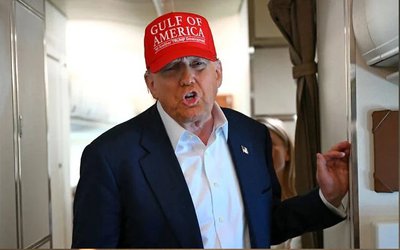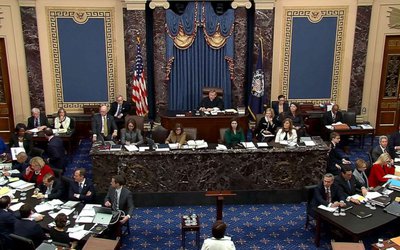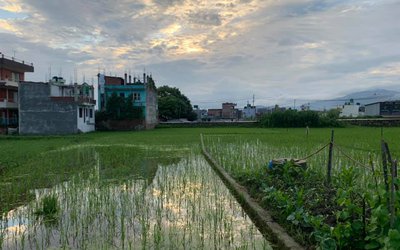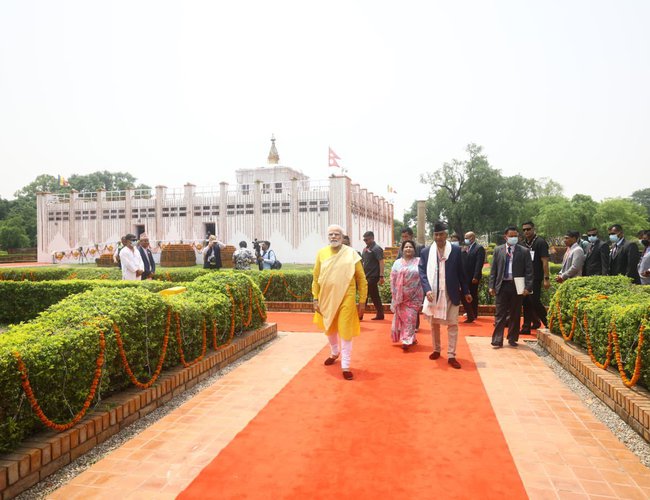
Nepalese Prime Minister Sher Bahadur Deuba and Indian Prime Minister Narendra Modi are prime ministers of two independent countries; they share one civilization, religion, culture and values.
The venue of Mayadevi Temple in Lumbini, the birthplace of Gautam Buddha, symbolizes how Nepal and India are bound by common civilization, culture and religion. This is the meeting point for both countries to strengthen and enhance bilateral relations.
In a recent religious function at Lumbini in Paritran Path, the body language of two Prime Ministers spoke volumes about their devotion and commitment.
As a devout spiritual personality, Indian PM Modi remained quiet, patient and humble during the entire religious functions organized in Lumbini on the auspicious occasion of Buddha Jayanti. Nepal’s Prime Minister Deuba, whose brother was in a coma at that moment, failed to reciprocate with the same commitment as Modi during the chanting of Paritran Path.
As Nepal and India share a common civilization, culture and religion, there are many points of agreement. In his last two tenures, Indian Prime Minister Narendra Modi pushed this common interest claiming India’s place in Nepal’s Buddist and Hindu heritage.
However, Nepalese prime ministers including Deuba have been not stable in dealing with bilateral matters reciprocating India’s claim. Undoubtedly, Nepal has many important religious places which have a direct connection with the Hindus and Buddhists of India. Whether Janakpurdhan, Pashupatinath, Muktinath and Lumbini, they are highly important for Buddhists and Hindus.
Although Prime Minister Deuba, despite his individual shortcomings in recent functions, has always been seen in compromising postures, he is yet to pursue commonalities to overcome disputes.
Although Nepal and India, two close neighbors, have certain differences, they are now coming much closer to pursuing common interests and values to strengthen bilateral relations, pushing the point of differences apart.
Even in India, Modi is the first Indian Prime Minister to visit Lumbini and to claim India’s place in Nepal’s Buddhist heritage. Although he had expressed a desire to visit the place during his first official visit to Nepal as Prime Minister in July 2014, the visit was realized almost eight years after.
The rush of India is understandable. In recent times, Nepal’s northern neighbor China has been pursuing Buddhism as its soft power coming with a huge investment to connect Lumbini with China.
After the recent visit by Prime Minister Modi and the signing of an agreement to support the construction of various sites in Lumbini, India has finally made efforts to reduce the influences.
With less than 10km south of its border, India had both a cultural and a security interest in the development of Lumbini. However, it has taken a decade for India to show its position on Lumbini.
After Modi’s visit, India has joined more than a dozen countries including China, Thailand, Vietnam, Myanmar, Japan, Taiwan, and South Korea to have a monastery of its own in the global project.
Although China continues to expand its influence, India itself showed no significant interest in building connectivity to Lumbini — or in promoting other shrines in Nepal.
For Hindus, Prime Minister Modi allocated funds for the renovation of the passage around the Pashupati Nath Temple and the building of a Dharamshala for pilgrims.
Both he and Uttar Pradesh Chief Minister Yogi Adityanath visited Janakpur, the birthplace of Sita — and announced a connectivity package to link the pilgrimage center to Ayodhya by a regular bus service. This was intended to be part of the proposed Ramayan circuit, but the project continues to lack clarity and a concrete roadmap.
Similarly, this time he allocated resources to build an international Buddhist Conference Hall in Lumbini.
Prime Minister Modi’s recent visit to Lumbini and India’s involvement to construct the Monastery will help to develop the Buddhist circuit, in which Lumbini would be a prominent stop.
Flying from Kushinagar, another Buddhist pilgrimage and part of the Buddhist circuit, Indian Prime Minister Modi has indicated the possible scenario for the development of the Buddhist circuit.
While the Indian message is clearly of shared cultural and religious links with Nepal that are removed from that of any other country, the fact, as an Indian diplomat pointed out privately, is that governments prior to Modi had done little to promote India’s soft power and religion in Nepal.
India’s Ties With Nepal Are Unparalleled: PM Modi
India's ties with Nepal are "unparalleled" said PM Modi, on the day of his departure for Lumbini in Nepal on the occasion of Buddha Purnima.
"Our ties with Nepal are unparalleled. The civilization and people-to-people contacts between India and Nepal form the enduring edifice of our close relationship," Modi said in his departure statement. "My visit is intended to celebrate and further deepen these time-honored linkages that have been fostered through centuries and recorded in our long history of inter-mingling," he said.
In the statement, Modi said he was looking forward to meeting Nepalese Prime Minister Sher Bahadur Deuba again after their "productive" discussions during his visit to India last month.
He said both sides will continue to build on the shared understanding to expand cooperation in multiple areas, including hydropower, development and connectivity.
The prime minister was paying a day-long visit to Lumbini on the occasion of Buddha Purnima. It was the prime minister’s fifth visit to Nepal since 2014.
“I look forward to offering prayers at the Mayadevi Temple on the auspicious occasion of Buddha Jayanti. I am honored to follow in the footsteps of millions of Indians to pay reverence at the sacred site of Lord Buddha’s birth,” Modi said.
Modi and Deuba held talks in Lumbini with a focus on further expanding cooperation in multiple areas including hydropower and connectivity.
PM Modi also participated in the foundation laying ceremony for the construction of a center for Buddhist culture and heritage in Lumbini.
“I have a feeling that the conversation between the two leaders will have a comprehensive agenda, will cover the entire scope of our discussions,” he said at a media briefing.
The visit to Modi contributed to further strengthening the bilateral relations and the age-old socio-cultural bonds between the two countries.
PM Deuba and Modi Talks
Prime Minister Deuba and PM Modi held talks on comprehensive agenda to further expand cooperation in multiple areas, including hydropower and connectivity.
Both prime ministers avoided discussion on disputed issues like EPG report and border.
According to a press release issued by the Ministry of Foreign Affairs, the two Prime Ministers held bilateral talks in Lumbini. They recalled the fruitful discussions they had in New Delhi during the official visit of Prime Minister Deuba to India on 1-3 April 2022. During the bilateral talks, the two Prime Ministers had a broad overview of Nepal-India cooperation and matters of mutual interests with a view to further enhancing the close and cordial ties between the two countries.
The Prime Minister of Nepal thanked the Prime Minister of India for the Government of India’s assistance in fighting the COVID-19 pandemic. He also expressed gratitude for India’s support in the post-earthquake reconstruction, including the heritage sites.
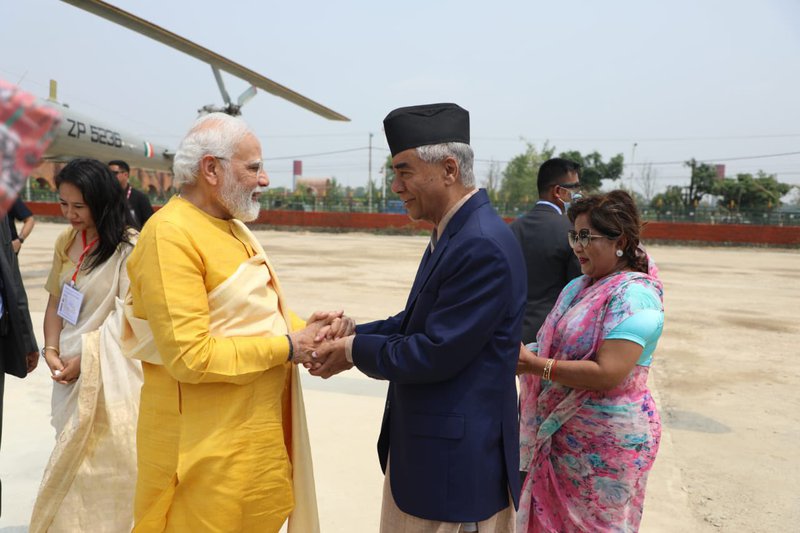
The two sides discussed promoting cooperation in connectivity; early supply of fertilizers; expeditious conclusion of the revised Transit Treaty, its Protocols and Memorandum; review of the treaty of trade; additional air entry routes; hydropower generation; culture and tourism including Buddhist circuit and Ramayana circuit; education and academic collaboration; increasing the threshold of carrying Indian currency by individuals; and cooperation at regional and multilateral forums in matters of mutual interest.
The two sides discussed infrastructure development including the dry port and integrated check posts in Chandani Dodhara as well as bridges linking Purnagiri Mai, Uttarakhand, India and Parshuram Dham in Dadeldhura, Nepal; and Jhulaghat over Mahakali River.
Prime Minister Deuba requested the Government of India to consider constructing the Motigada-Fattepur-Rampur Road in the Udaypur district of Nepal under Indian grant assistance.
In the context of the official inauguration and commencement of commercial operation of the Gautam Buddha International Airport, Prime Minister Deuba highlighted that the airport will further facilitate connectivity, cultural linkages, and people-to-people movements and promotes cultural tourism. He also requested the additional air entry routes from Mahendranagar, Nepalgunj and Janakpur.
The Prime Minister of India assured that authorities concerned in India would take up the matters raised by Prime Minister Deuba.
Prime Minister Deuba requested seamless power trade on a long-term basis under mutually beneficial terms. The two sides expressed satisfaction that the Arun III project is progressing well and welcomed the signing and exchange of MoU between Nepal Electricity Authority and SJVN Ltd. India for the development of Arun-IV hydropower project.
The two Prime Ministers stressed the importance of hydropower for clean energy and noted that immense potentials exist for Public-Private Partnership (PPP) in the hydropower sector. Prime Minister Deuba invited interested companies from India such as NHPC for the development of the West Seti Hydroelectricity project. The two Prime Ministers agreed to take up the Pancheswor Project with priority.
The two sides also agreed in principle to establish the sister city relations between Lumbini and Kushinagar. The necessary process will be taken in due course through appropriate local authorities
Earlier, Indian foreign secretary Kwatra said India has always maintained that the existing bilateral mechanisms are the best way forward to deliberate on the issues, adding they should be discussed in a “responsible manner” without their “politicization”.
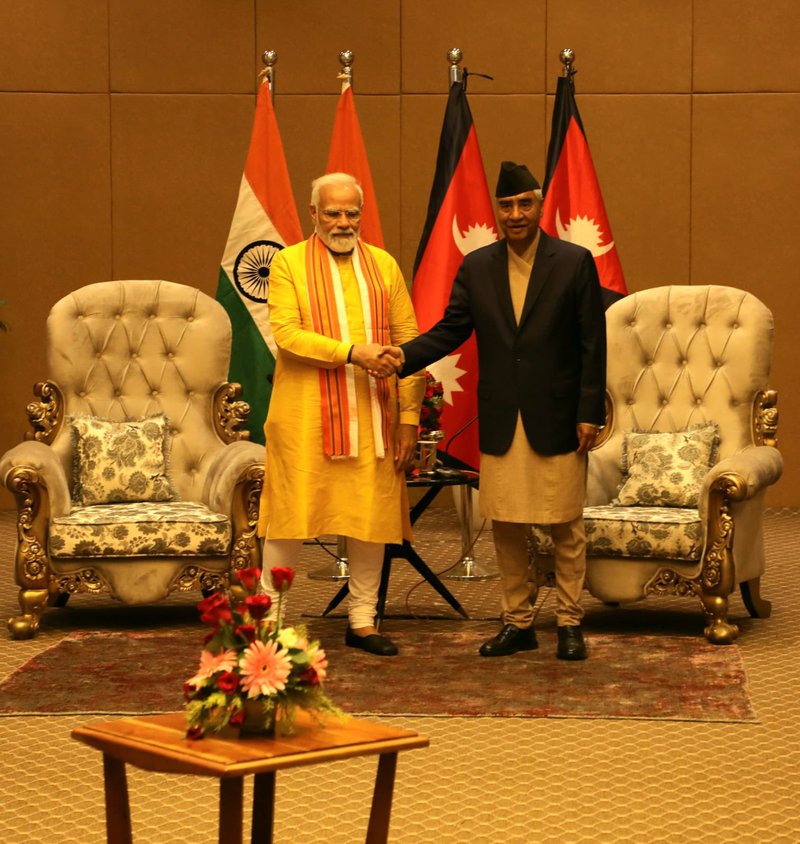
“The fact that a return visit is taking place in such a close succession is a reflection of the closeness of our high-level exchanges as well as of the upward trajectory in our mutually beneficial partnership,” Kwatra said.
On the last visit, Nepal’s foreign ministry fully backed prime minister Deuba’s desire to make the visit a success. Foreign Minister Dr. Narayan Khadka and Foreign Secretary Bharat Raj Paudyal along with a high-level team of the Ministry made all preparations. To make the visit a success, foreign secretary Paudyal led a team of MOFA to reach Bhairawa a day earlier.
The words of spokesperson Of the Ministry of Foreign Affairs Sewa Lamsal said that the recent visit of Indian Prime Minister Narendra Modi to Lumbini, the birthplace of Lord Buddha, has not only strengthened the ties between Nepal and India, but also helped to take the relationship to people’s level, and promotion of the holy place globally.
Nepal and India are on right track for fostering their bilateral relations based on their common culture and values. The visit by Indian Prime Minister Modi to Lumbini has a clear message Nepal and India relations are unparalleled.
The two Prime Ministers also witnessed the exchange of the following Memoranda of Understanding related to cooperation and collaboration in the academic field and power sector:
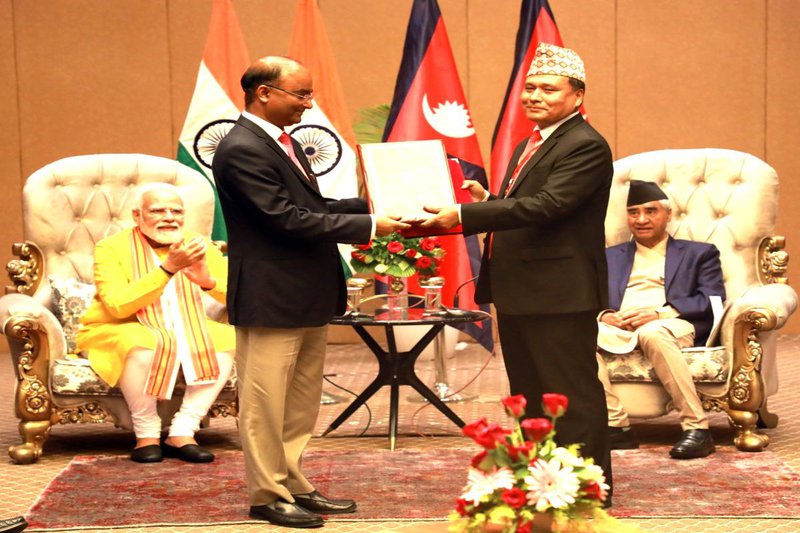
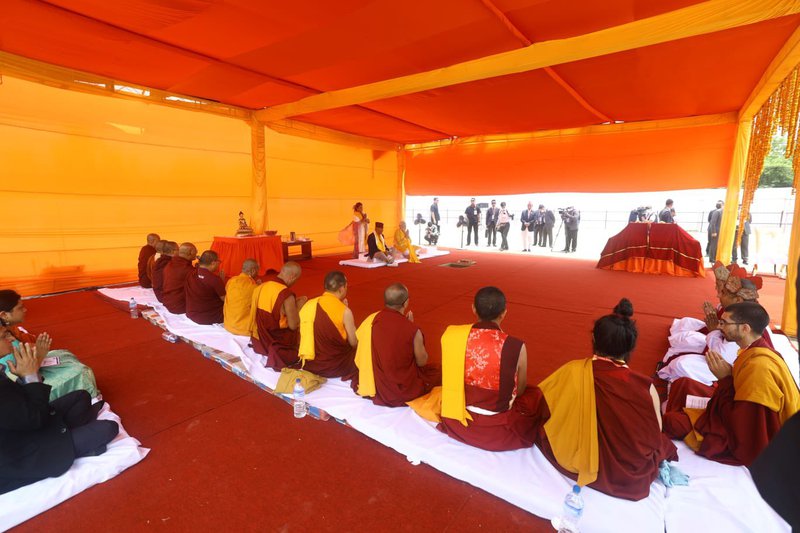

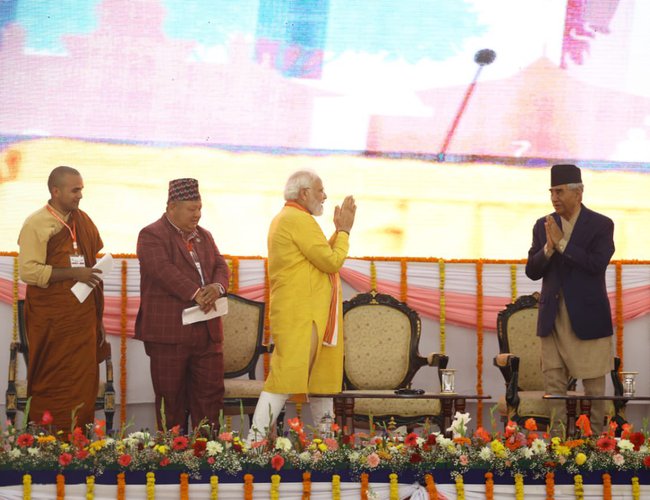
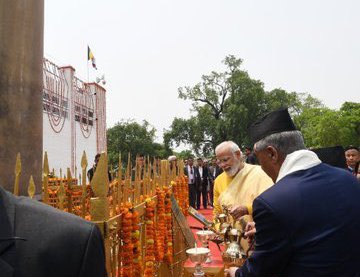

Keshab Poudel
Poudel is the editor of New Spotlight Magazine.
- FOURTH PROFESSOR Y.N. KHANAL LECTURE: Nepal-China Relations
- Jun 23, 2025
- Colonel JP CROSS: Centenary Birthday
- Jun 23, 2025
- REEEP-GREEN: Empowering Communities with MEP
- Jun 16, 2025
- BEEN: Retrofitted For Green
- May 28, 2025
- GGGI has been promoting green growth in Nepal for a decade: Dr. Malle Fofana
- May 21, 2025






